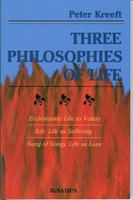Toil
 I was recently reading Peter Kreeft's marvelous book Three Philosophies of Life, in which he explores the significance of Ecclesiastes, Job and Song of Songs. In presenting Ecclesiastes, he explains that the book of Ecclesiastes presents the greatest question that can be asked, while the rest of the Bible is the answer to that question. He also states that this particular book is essentially trying to make sense of life without faith in God.
I was recently reading Peter Kreeft's marvelous book Three Philosophies of Life, in which he explores the significance of Ecclesiastes, Job and Song of Songs. In presenting Ecclesiastes, he explains that the book of Ecclesiastes presents the greatest question that can be asked, while the rest of the Bible is the answer to that question. He also states that this particular book is essentially trying to make sense of life without faith in God.One thing I love about Kreeft is how clear and logical his writing is. One particularly helpful insight made in this book is that the whole book of Ecclesiastes can be broken down into a logical syllogism:
1. All “toil” is “under the sun”.
2. And all “under the sun” is “vanity”.
3. Therefore, all “toil” is “vanity”.
Upon inspection of this syllogism, we can see that it is indeed valid. But, asks Kreeft, is it sound? In other words, the conclusion necessarily follows from the premises, but are the premises true? Kreeft suggests that premise 1 is false, and I agree.
As I was reading Ecclesiastes, and kept encountering the word "toil," it occured to me that I had been struck by this word somewhere else in the Bible: “Therefore, my beloved brethren, be steadfast, immovable, always abounding in the work of the Lord, knowing that your toil is not in vain in the Lord.”
That's it, not all "toil" is "under the sun." There is a "toil" that is beyond the sun, it is a heavenly toil; the "toil in the Lord." It is any toil whose end or purpose is "Thy kingdom come, Thy will be done on earth as it is in heaven."
How fitting that Paul would mention this at the end of 1 Corinthians 15, one of the greatest passages on the resurrection. Paul is emphatically telling Christians that life is not vanity of vanities, that there is hope, and that our hope is the resurrection. Therefore, work hard and persevere with hope, knowing that your "toil" is not "under the sun" and therefore "vanity," since it is "toil in the Lord."
It makes me think that perhaps he had Ecclesiasastes in mind when he wrote this. Thoughts?
2 Comments:
It sounds like a good connection.
I also see some other general parallels between Ecclesiastes and Paul's Letters:
1)
"12 I know that there is nothing better for men than to be happy and do good while they live. 13 That everyone may eat and drink, and find satisfaction in all his toil—this is the gift of God. 14 I know that everything God does will endure forever; nothing can be added to it and nothing taken from it. God does it so that men will revere him." - Ecc 3
and
"6But godliness with contentment is great gain. 7For we brought nothing into the world, and we can take nothing out of it. 8But if we have food and clothing, we will be content with that." - 1 Timothy 6
2)
"18 Then I realized that it is good and proper for a man to eat and drink, and to find satisfaction in his toilsome labor under the sun during the few days of life God has given him—for this is his lot. 19 Moreover, when God gives any man wealth and possessions, and enables him to enjoy them, to accept his lot and be happy in his work—this is a gift of God." - Ecc 5
and
"12I know what it is to be in need, and I know what it is to have plenty. I have learned the secret of being content in any and every situation, whether well fed or hungry, whether living in plenty or in want." - Phil 4
Contentment seems to be one of the themes in Ecclesiastes reiterated by Paul. If we toil simply to accumulate the things of this world - riches, fame, pleasure - our toil is meaningless. However, if we are content with the gifts of God and use them for his kingdom, whether little or plenty, our toil can begin to have meaning.
Great points, Vijay.
Perhaps Ecclesiastes was a popular book among the epicureans of his day or something. If so, maybe having that context would help us better understand what he was answering when he wrote some of these things.
Interesting to think about.
Cheers.
Post a Comment
<< Home